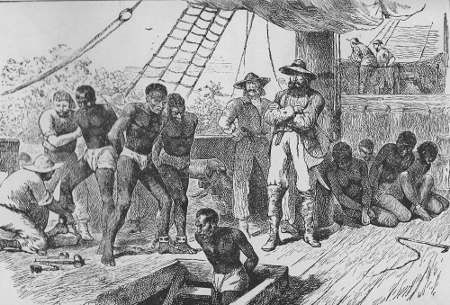A Slaver Captain tells of His Conversion.

How would you describe your life? One man describing his early life wrote:
"In evil long I took delight,
Unawed by shame or fear."
This was a good description of his life, recording in the next two lines:
"Till a new object struck my sight,
And stopped my wild career."
Who was this man who could write such things? His name was John Newton. He joined the Navy as a Midshipman but deserted; was flogged for his crime and removed from the rank of Midshipman. Eventually he arrived in Africa and drifted about completely destitute. He received work from a slave trader on Plantain Island just off the coast of Sierra Leone. When the trader was away his mistress took over the management. Newton was ill and came under the hatred of the woman. He received little food and went into the forest and ate whatever roots he could find. Slaves secretly gave him scraps from their almost starvation diet.
One day a ship came to the island, owned by a friend of Newton's father, who hearing his friend was sailing for Africa had asked him to try and hear any news of his son John. This friend took John Newton on board and eventually sailed for home. On the journey a great storm arose and all thought they would drown. This caused John to consider his standing before God and a new object struck his sight?
What new object struck his sight?
“I saw One hanging on a tree,
In agonies and blood,
Who fixed his languid eyes on me
As near the cross I stood.”
His mind and heart opened:
“Sure never till my latest breath
Can I forget that look;
It seemed to charge me with His death,
Though not a word he spoke”
“My conscience felt, and owned the guilt,
And plunged me in despair;
I saw my sins His blood had spilt,
And helped to nail Him there.”
His heart trembled:
“Alas I knew not what I did;
But now my tears are vain;
Where shall my trembling soul be hid?
For I the Lord have slain.”
His heart melted:
“A second look He gave, which said,
'I freely all forgive;
This blood is for thy ransom paid,
I die, that thou may'st live.”
Pardon received:
“Thus, while His death my sin displays
In all its blackest hue,
(Such is the mystery of grace)
It seals my pardon too.”
Joy entered his heart and soul:
“With pleasing grief and mournful joy
My spirit now is filled,
That I should such a life destroy,
Yet live by Him I killed.”
In a famous hymn Newton wrote, “Amazing grace, how sweet the sound that saved a wretch like me.” and again, “Yes, when this flesh and heart shall fail, And mortal life shall cease, I shall possess within the veil a life of joy and peace.”
Newton trusted Christ as his Saviour and would do so until the end of his life. Towards his death he wrote, “Although my memory's fading, I remember two things very clearly: I am a great sinner and Christ is a great Saviour.”
Hear Christ's words:
“Him that cometh to me I will in no wise cast out.”(John 6:37)
“I am the resurrection, and the life: he that believeth in me, though he were dead, yet shall he live:” (John 11:25)